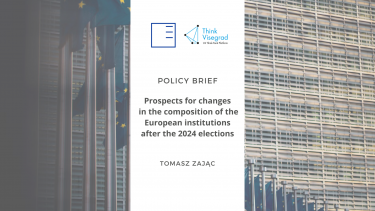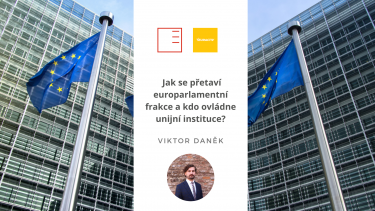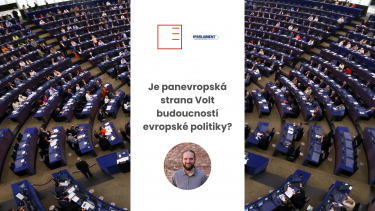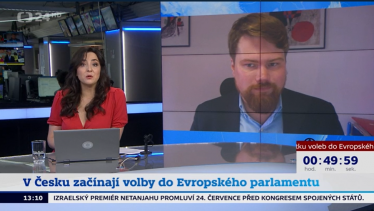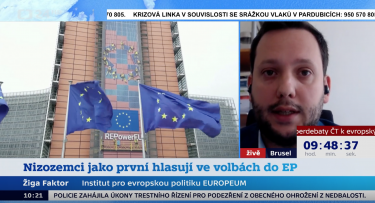Policy Brief | Prospects for changes in the composition of the European institutions after the 2024 elections
This policy brief analyses the prospective changes in the European Parliament (EP) composition following the 2024 elections. It reflects on the evolving political environment since 2019, highlighting shifts in party dynamics within the EP, such as the fragmentation of traditional party dominance and the emergence of new political alignments. Additionally, it explores potential reconfigurations in top EU positions post-elections and examines ongoing concerns regarding geographical representation within EU institutions, particularly the European Commission. Writes Tomasz Zając from the Polish Institute of International Affairs (PISM).
Show morePolicy Brief | Vyhlídky na změny ve složení evropských institucí po volbách v roce 2024
Publikace analyzuje možné změny ve složení Evropského parlamentu po volbách v roce 2024, zamýšlí se nad vývojem politického prostředí od roku 2019 a poukazuje na posuny ve stranické dynamice, jako je roztříštění tradiční stranické dominance a vznik nových politických uskupení. Kromě toho zkoumá možné změny v obsazení vrcholných pozic v EU po volbách a zabývá se přetrvávajícími obavami ohledně geografického zastoupení v institucích EU, zejména v Evropské komisi. Píše Tomasz Zając z Polského institutu mezinárodních vztahů (PISM).
Show moreEuractiv.cz | Post-election reshuffles. How will the European Parliament factions transform and who will dominate the EU institutions?
The key issues for the new term in the EU do not end with the European elections. Forces in European Parliament continue to shift depending on factions, while leaders select institutional leadership. How will the elections and the composition of the European Parliament influence the future functioning of the EU? And who will lead it? Viktor Daněk, Deputy Director of EUROPEUM Institute, answered these questions for Euractiv.cz.
Show moreThe Parliament Magazine | Is pan-European party Volt the future of EU politics?
The political group Volt received five times more votes in this year's European elections compared to 2019. Does it have the potential to gain even more support? Where did this political group come from and what is in its program? Vít Havelka, Senior Researcher at EUROPEUM Institute, commented for The Parliament Magazine.
Show more
ČT24 | Low turnout of Czech voters in European elections
Czechs wield significant power in Brussels, within the European Union, we rank as the ninth most populous country, placing us among the medium-sized nations. Moreover, Czechia is economically strong country. Yet, the turnout of Czech voters in European elections remains traditionally low, not only compared to other elections in the Czech Republic but also on a European scale. Martin Vokálek, Executive Director of EUROPEUM Institute, discussed low turnout and other topics for ČT24.
Show more
ČT24 | European Parliament elections begin
Do the elections across European countries have a common theme? If far-right parties succeed, can they unite? How can the problem of long-term low voter turnout in European elections be explained? Is this trend only in Central Europe? Can candidates for the European Parliament really deliver on what they promise? What happens immediately after the elections? Žiga Faktor, Deputy Director and Head of the Brussels Office of EUROPEUM Institute, answered these and other questions.
Show more
RILSA | The uncertain fate of the Green Deal for Europe ahead of the European Parliament elections
Farmers' protests have reminded that the measures of the Green Deal for Europe may not be politically viable for Europeans. To make climate policies politically viable, the EU should therefore focus on its commitment not to leave anyone behind in the green transition. Klára Votavová, a researcher at EUROPEUM Institute for European Policy, discusses the current development of the Green Deal for Europe and its social policy aspects in an expert publication for the Social Policy Forum.
Show moreVisegrad/Insight | Tractors Trending: V4 Populists Appropriate the Farmers’ Protests Ahead of the EP Elections
The populist camps in the Visegrad Four countries have used the farmers' protests in their populist campaigns for the European Parliament elections in June. A fundamental change to the last EU elections in 2019 is visible in the politicians' messages towards the people, with social media taking over the classic platforms such as television, press or radio. Project Manager of Global Europe programme at EUROPEUM Institute, Oszkár Roginer-Hofmeister, wrote an article on this topic for Visegrad/Insight.
Show more
Visegrad/Insight | Traktory v trendu: Populisté z V4 si před volbami do EP přivlastnili protesty zemědělců
Populistické tábory v zemích Visegrádské čtyřky využily protesty zemědělců ve svých kampaních k červnovým volbám do Evropského parlamentu. Zásadní změna oproti posledním eurovolbám v roce 2019 je patrná ve formě sdělení politiků směrem k lidem. Sociální sítě přebírají důležitost klasických platforem, jako je televize, tisk nebo rozhlas. Článek na toto téma napsal pro Visegrad/Insight Oszkár Roginer-Hofmeister, projektový manažer programu Globální Evropa v Institutu EUROPEUM.
Show more
EURACTIV.cz: "Being prime minister is still more than being a heavyweight in Brussels." Boss von der Leyen is falling apart Commission
The head of our Brussels office, Žiga Faktor, spoke to EURACTIV.cz about the departure of Dutchman Frans Timmermans from the European Commission. The influential vice-president of the European Commission was lured by the prospect of the prime minister's chair in the Netherlands, and his boss, Ursula von der Leyen, has to manage without him. But her difficulties do not end there, a year before the European elections.
Show more
Staroměstské náměstí 4/1
Prague 1 - Staré Město
110 00
tel.: +420 212 246 552
email: europeum@europeum.org
https://www.europeum.org
